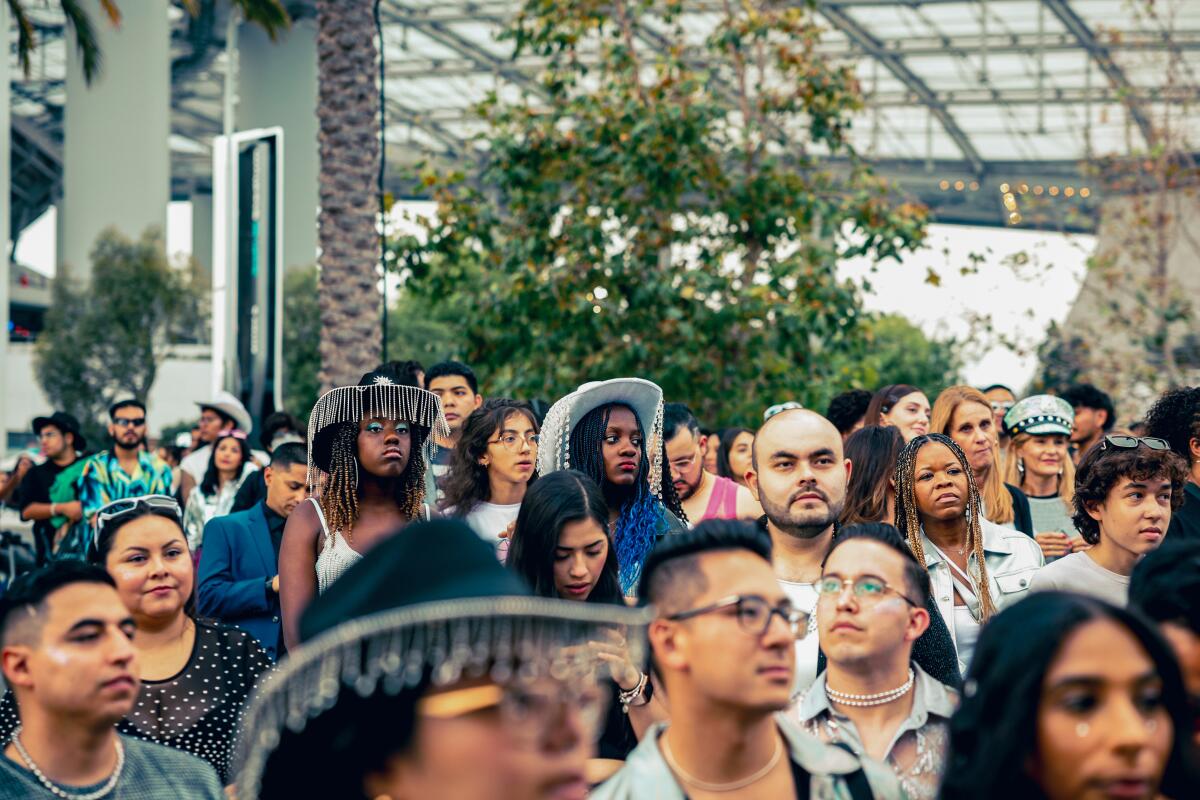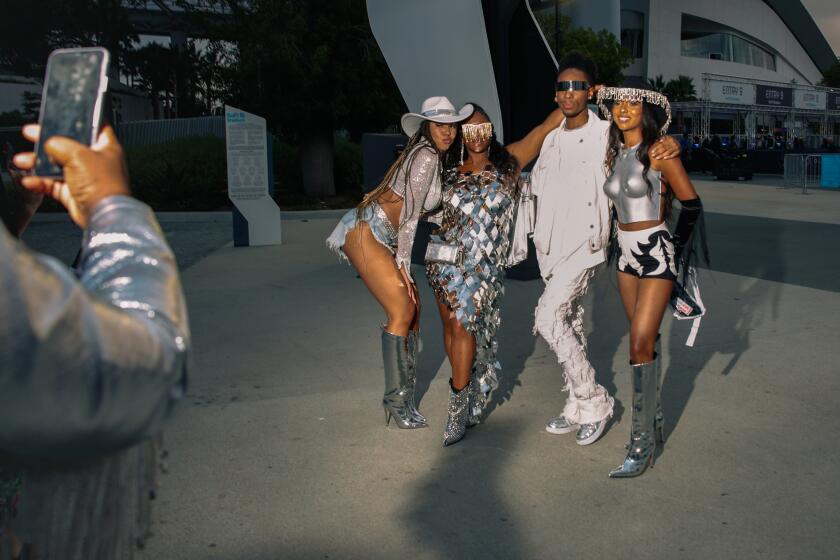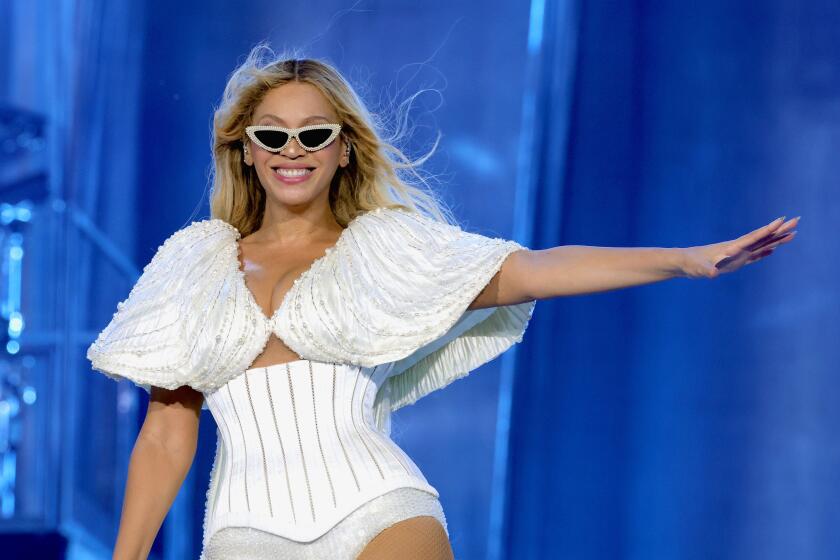Beyoncé’s birthday Renaissance show celebrated the depths of Black womanhood

Watching Beyoncé at the Renaissance tour is an exercise in ripping open and throwing aside the boxes of ourselves and leaving them strewn among folding fans and silver sequins.
- Share via
It didn’t dawn on me until my second time seeing Beyoncé perform this week that I have been a fan for all of my life so far.
She pointed it out when she gave a short opening speech during the show on her birthday expressing gratitude to everyone who had supported her since 1997. I didn’t realize I could attach a year to how long I’ve loved her and her music.
I started as a Destiny’s Child fan at about 6 years old. I would perk up from reading my books when seeing this group of beautiful Black women appear on the television screen. I remember hearing the beat of “No, No, No” come on the radio. At age 7 I had no clue what a “Bug A Boo” was, but I knew the words to the song and would bob my head to the beat. I didn’t know about “Bills, Bills, Bills,” but I sang the chorus like I had them, making sure to be just as emphatic as the group was with the “I don’t think you do” and trying to elongate my o’s at “so you and me are through.” Years later I still smile if “Lose my Breath” or “Survivor” or “Bootylicious” starts playing in a happenstance shuffle of my playlists.
When the group parted ways, many of us virtually lined up to support Beyoncé’s solo career. We remember the attempts at doing the Beyoncé bounce from “Crazy in Love” or trying to catch a glimpse of any of her music videos on BET’s 106 and Park or MTV’s TRL. We sent nonexistent and real exes packing when “Irreplaceable” and “Single Ladies” were released and later on dissected images and meanings when rewatching the visuals for her “Lemonade” album. I remember being in awe at 12 years old — with my acne scars, big glasses and lacking a sense of confidence in my looks — when she did her walkway strut toward the screen in her orange dress in the last scenes of the “Crazy in Love” music video. I was listening to her albums as I hustled to and from classes during college, putting together my internship applications and during long drives to move to new cities for new jobs. I was sad to not see her live at Beychella, but I did smile watching the footage of her dancing with her sister Solange to the end of “Get Me Bodied.” Her Renaissance album came out on the six-month mark of my father’s passing. Almost every era of my life can be traced to a Beyoncé song.
Check out our photo gallery from Beyoncé’s Renaissance World Tour stop at SoFi Stadium in Los Angeles. Beyoncé asked the beyhive to don their “most fabulous silver fashions” to celebrate “Virgo season together in the house of chrome,” and her fans delivered.
As I watched people make their way to their seats in SoFi Stadium, I smiled seeing the creative outfits. The displays of chests, thighs and cheeks on every body type in sequins or sheer shirts answered the evening’s call to freedom of body, movement and expression. But I also considered what it took for all of us to be sitting at SoFi just to be in the same arena of Queen Bey. I smiled thinking of how many text threads and phone calls last summer revolved around the Renaissance album that was played on repeat for weeks and months to relive the thrill of the song transitions or debate the top songs. There were people who determinedly budgeted for tickets and started a new savings account just to scrape their dollars together for the tour. There were people who prayed for a ticket code and then had to do an Ocean’s 11 style coordination among their friends and family to make it through the TicketMaster trenches to get a coveted seat.

Beyoncé’s birthday show transcended the decades of creativity, love and growth that she pours into her work and journey in womanhood. When she opened with “Dangerously in Love,” the song and title of her first solo album, looking serene and regal, hair billowing softly with the stage fans, I was reminded of the courage and faith she had in herself to pursue a solo career. Somewhere amid the emotional lump in my throat as she sang — as if I hadn’t just seen her perform in late July — I could feel the vibrations of the final crescendo of the song in my chest as her notes went higher. Her performance of “Flaws and All” when she smiled into the camera while singing the line “I don’t know why you love me” was a moving reminder of how her pursuit of impeccability still allows her to own and embrace the imperfections she likely tries to work on as a human, daughter, sister, wife, friend and artist. In these opening moments the BeyHive could bask in the memories of longtime love for Beyoncé and what was collectively endured to be there in the darkness of that arena with nothing but the stage screen, lights, sequins and soft glows of cellphones.
Seeing Beyoncé perform at any of her shows on this tour was bound to be a soul-restoring experience. But seeing her perform on her birthday and get to celebrate among the BeyHive holds a special significance. We watched her make a speech that left many of us with lumps in our throats or tears rolling down our face as she talked about turning 42 and expressing gratitude that she was still alive and here with us performing, for the healing power of music, the support and love of her family and friends and fans and for the stretch marks and FUPAs that come with aging, body changes and womanhood.
A singular force, Beyoncé honored her musical and spiritual forebearers and proved herself, once again, to be as dynamic a performer as pop music has ever seen.
The reality is too many Black women don’t make it to 42 and too many are not celebrated. We’re dying from childbirth. We’re dying from violence. We’re going missing and hardly anyone is looking for us. We’re overlooked and undervalued. In an era when the pleas and battle cries of “support Black women” and “protect Black women” often ring hollow, displays of reverence and joy over Black women’s existence is often fleeting. When Black women attempt to celebrate their achievements and survival when others won’t or to speak their truth about experiences with racism, prejudice, violence and misogynoir, there’s a virtual shushing that tends to happen. Black women are pressured to be the backbone for people, institutions and systems when their backs are already breaking or broken. Being part of the BeyHive often means Beyoncé’s music takes the weight of the world off of our backs whether its a three-minute song or a near three-hour concert. The BeyHive protects Beyoncé because her existence and music have so often offered refuge from the world when loud and proud versions of love, support and positivity can be hard to find. The only time Beyoncé calls for us to mute ourselves is during the song “Energy,” nothing more, nothing less.
But observing and experiencing her performance means bearing witness to a celebration of the depths of our collective multitudes. Black women are often tasked with boxing up their expressiveness and expansiveness to make space for others. For the sake of others’ comforts and perceived social order Black women are asked to pack away our joy, our anger, our sadness, our tiredness, our bodies, our political convictions, our ideas, our creativity, our truths and our achievements. Watching Beyoncé and her team perform at the Renaissance tour is an exercise in ripping open and throwing aside the boxes of ourselves and leaving them strewn behind folding fans and silver sequins. Celebrating getting to see Beyoncé live on her birthday meant getting to celebrate the wide range of being we do not always get to openly sit with like unapologetic displays of self-love, self-worth and self-belief, sexuality and sexual prowess and grief over lost time and lost love. While anything offered for public consumption is open to critique, the Renaissance show was a grandiose dare to anyone who tried to ask us to be less of ourselves.
That meant being nearly out of breath trying to sing the repeated last lines of “Love on Top” while Beyoncé pointed the mic to the crowd because even though she couldn’t see us you wanted to make her proud that we attempted to hit the notes. We got chills watching her and the other performers do the slow nod to the opening beats of “Formation” as Big Freedia’s voiceover made clear we would have a taste of what Queen Bey wanted to offer us and nothing more. We all sounded like proud family members at a graduation as we watched her daughter Blue Ivy dance. We made sure to do her and her Uncle Johnny proud when we sang the last one minute and 19 seconds of “Heated.” We were all in communal disbelief and excitement when Diana Ross appeared on stage and led us in singing happy birthday to Beyoncé, a meeting between two generations on a stage that you may only see live in person once in your lifetime. We nearly fell out when Kendrick Lamar made an appearance to rap his part of the “America Has a Problem” remix while Beyoncé danced. At the end of each show on the tour she is lifted off of a large silver horse amid falling silver confetti.
You don’t want to be the person who says “you just had to be there,” but in some ways you had to be. It’s an echo of the renaissances we read about now — you can’t unsee it and you have to spread the word about it because you can’t keep the newfound experience of inspiration, grandness and creativity to yourself.
At the end of the show, Beyoncé called on the audience to hold onto how they feel in that moment and remember who they were with. The trouble with celebrations is you don’t want them to end because you don’t know if or when you’ll be able to feel that euphoric feeling again. Celebrations are so often scheduled, but it’s not promised everyone will be there. For Black women especially, time is often of the essence to celebrate and uplift them while they can still see it, hear it, feel it and revel in it.
More to Read
The biggest entertainment stories
Get our big stories about Hollywood, film, television, music, arts, culture and more right in your inbox as soon as they publish.
You may occasionally receive promotional content from the Los Angeles Times.












